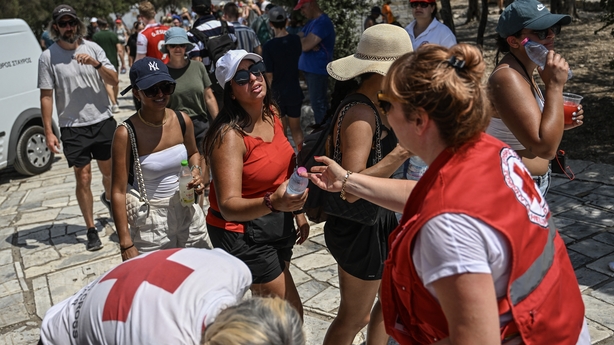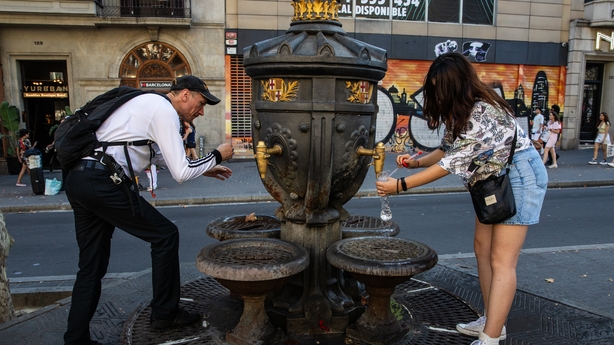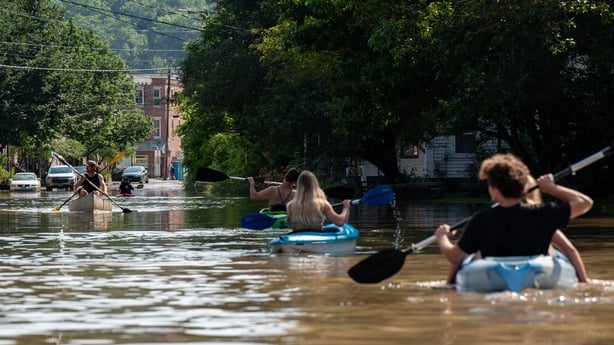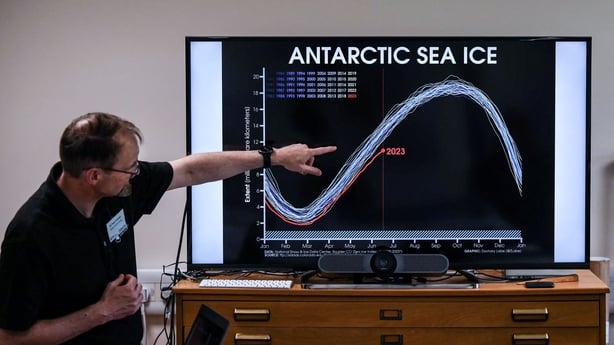Greece closed the ancient Acropolis during the hottest part of the day to protect tourists as southern Europe suffered in a fierce heatwave, while more than 100 million Americans also faced a prolonged spell of sweltering weather.
The European Space Agency (ESA), whose satellites monitor land and sea temperatures, has warned that Italy, Spain, France, Germany and Poland are all facing extreme conditions.
Temperatures next week could break Europe's current record of 48.8C recorded in Sicily in August 2021.
Italian meteorologists have dubbed the next phase of the European heatwave "Charon", a reference to the ferryman of the souls of the dead in Greek mythology.
That succeeds this week's "Cerberus" named after the three-headed dog of the underworld.
The world recorded its hottest day ever last week, with scientists blaming the combination of long-term global warming caused by greenhouse gases, with the short-term boost from El Niño, a regular warm-weather pattern originating in the Pacific.
In many places in the southwest of the United States, where hot summers are the norm, extreme temperatures that could break records are forecast in the coming days.
The city of Phoenix in Arizona has already had 15 days in a row with temperatures exceeding 43.3C, with mobile clinics treating homeless people suffering from third degree burns and severe dehydration.
The impact of extreme summer heat has been brought into focus by a study this week that said as many as 61,000 people may have died in the sweltering heat across Europe last summer.
Joan Ballester, a professor at the Barcelona Institute for Global Health, said France had learned lessons from a deadly 2003 heatwave that countries such as Italy, Greece, Spain and Portugal could follow.
"There are measures that are relatively cheap, like for example, coordinating public entities also doing a census of vulnerable populations," Ballester, a co-author of this week's study, said.
"But there are much more expensive measures, like for example, the redesign of cities to improve housing conditions," he said.

In Athens, with temperatures peaking above 40C, authorities closed the Acropolis Hill, home to the Parthenon temple that is visited by millions of tourists every year, from noon to 5pm local time.
Huge crowds had earlier formed long queues in the heat to enter the site, many donning hats and fanning themselves, others drinking water and carrying umbrellas.
The hill becomes particularly stifling due to its altitude and lack of shade.
One woman seated on the ground was attended to by paramedics after feeling faint.
Others were brought down from the Acropolis Hill in golf carts and transferred to wheelchairs.
Greece's civil protection ministry warned of the risk of forest fires in five areas and told people to avoid tasks such as burning weeds for fear of setting off blazes.
Wildfires also hit parts of Croatia close to the Adriatic coast.

Doctors warned that poorer elderly people with existing health problems were most at risk.
"They suffer from heart issues, chronic bronchitis, stroke, kidney failure," said Angel Abad, from the office of sustainable development at Madrid's La Paz hospital.
"Most have a low socio-economic background and we know that in these cases people who don't have air conditioning are more vulnerable.
They face a higher risk and higher mortality upon arriving at an emergency ward," added Mr Abad, a preventive medicine and public health specialist.
The mercury may soar as high as 48C on the islands of Sicily and Sardinia, the ESA said - "potentially the hottest temperatures ever recorded in Europe".
Carlo Buontempo, Director of the EU's Copernicus Climate Change Monitoring Service, said that high temperatures in Europe are "not an isolated case".
"You can look at the meteorology that is driving these extremes, but I think it is also worth zooming out a bit and seeing what's happening to the whole planet.
"We know that the climate is changing, we know that with the warming temperatures heatwaves will become more common, more frequent, more tense," he said.
Mr Buontempo told RTÉ's Morning Ireland that there are an increasing amount of these record-breaking events and they are not "just a fluctuation, a random event" but part of a pattern that will only increase with climate change.
"We should use these opportunities to learn about the future and start to prepare for what is going to come in the next few years," he added.
Temperatures pose risk to health
The Medical Director of the Irish College of General Practitioners (ICGP) has warned that high temperatures in the EU at present pose a risk to those at the more extreme age groups such as babies, smaller children and older people, as well as those with chronic disease.
Dr Diarmuid Quinlan said that people who have booked holidays abroad next week at the extremes of age should seriously think about the benefits of going on holidays.
He said that the risk was substantial to people, especially for people who are not used to these temperatures such as Irish holiday makers.
Speaking on RTÉ's News At One, he pointed out that those with chronic disease such as diabetes, heart disease or kidney disease are also at risk.
The problems associated in addition to the risk of sun burn, are dehydration and heat exhaustion which are serious conditions.
Dr Quinlan said that the symptoms of heat exhaustion are feeling nauseated, thirsty, vomiting, headaches, feeling weak, dizzy or faint, muscle cramps or getting confused or agitated.
In terms of managing this, he said that it is important to make sure that people have enough to drink, avoid alcohol or be modest in intake. Sleep in the coolest room of the accommodation and avoid sun exposure at the hottest part of the day from 11am and wait to go out until late afternoon or evening when it cools down.
He also suggested wearing long and loose clothing, seek shade and use sunglasses. He said that those staying indoors should open windows, use a fan and take cold showers.
"If we are exposed to continued high heat, our body temperature tends to rise, and the ability to manage that temperature is impaired.. so you need to do as much as possible trying to get temperatures down," he added.
Meanwhile, North Africa has also been sweltering and the Moroccan meteorological service issued an extreme heat red alert for southern parts of the country.
Some regions of China, including the capital Beijing, are also experiencing sweltering temperatures and a major Chinese power company said its single-day power generation hit a record high on Monday.

Last month was already the hottest June on record, according to the US space agency NASA and the European Union's Copernicus Climate Change Service.
Extreme weather resulting from a warming climate is "unfortunately becoming the new normal," warns Secretary-General Petteri Taalas of the World Meteorological Organization (WMO).
Excessive heat is one of the deadliest meteorological events, according to the WMO. One recent study estimates over 61,000 people died from heat during Europe's record-breaking summer last year.
Death Valley
El Niño events, which occur every two to seven years, are marked by warmer-than-average sea surface temperatures in the central and eastern Pacific near the Equator, and last about nine to 12 months.
North America has already seen a series of extreme meteorological events this summer, with smoke from wildfires that continue to burn out of control in Canada causing extraordinary air pollution across large parts of the United States.
The US northeast, particularly Vermont, has also recently been pummelled by torrential rains which have caused devastating floods.

According to climate scientists, global warming can cause heavier and more frequent rainfall.
Meanwhile, residents of much of the southern United States have been experiencing unrelenting high temperatures for weeks.
Daniel Swain, a climate scientist at the University of California, Los Angeles, said the temperature in Death Valley could equal or surpass the record for the hottest air temperature ever reliably measured on Earth.
The WMO's official record is 56.7C recorded in Death Valley, in the southern California desert. But that was measured in 1913 and Mr Swain stands by the figure of 54.4C from 2020 and 2021.
'Exceptionally high'
The oceans have not been spared from the warm early summer either.
Water temperatures off the southern coast of Florida have surpassed 32C, according to the National Oceanic and Atmospheric Administration.
As for the Mediterranean, surface temperatures will be "exceptionally high" over the coming days and weeks, the WMO said, exceeding 30C in some parts, several degrees above average.
Warming ocean temperatures can have devastating consequences for aquatic life both in terms of survival and migration and can also negatively impact the fishing industry.

At the other end of the planet, Antarctic sea ice hit its lowest recorded level for a month of June.
The world has warmed an average of nearly 1.2C since the mid-1800s, unleashing more intense heatwaves, more severe droughts in some areas and storms made fiercer by rising seas.
The WMO's Mr Taalas said the current heat wave "underlines the increasing urgency of cutting greenhouse gas emissions as quickly and as deeply as possible".

